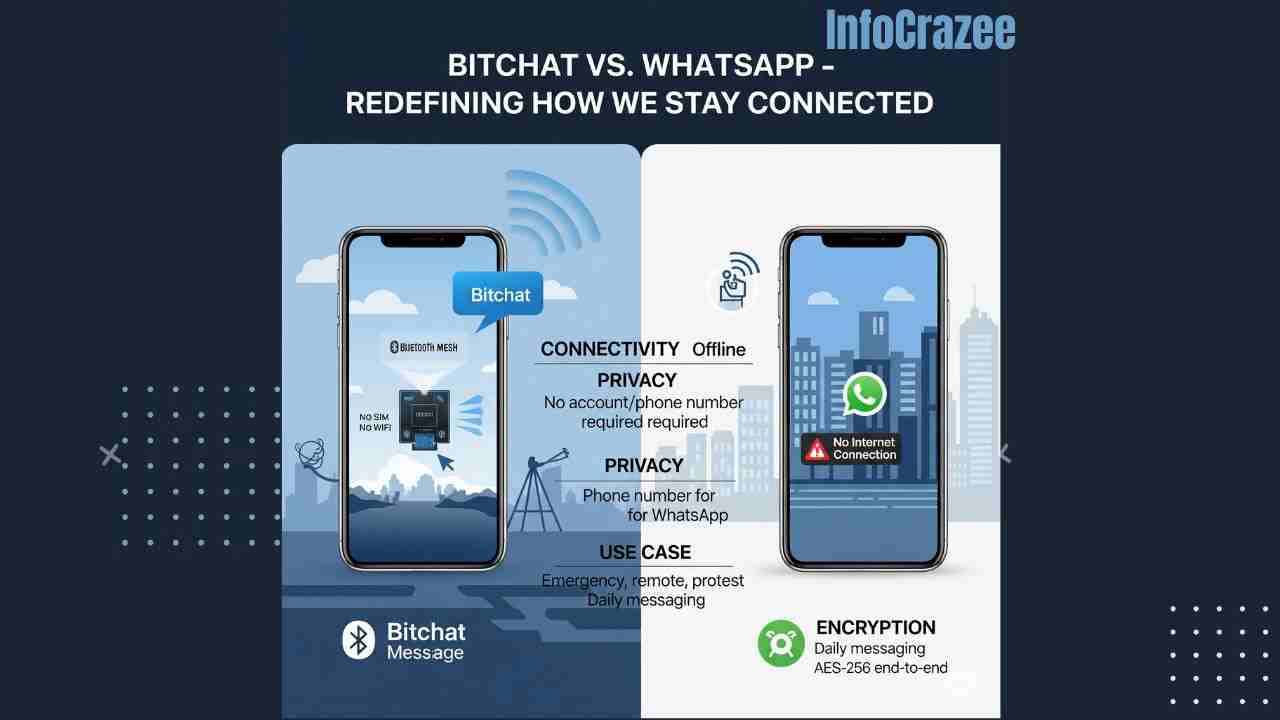Bitchat vs. WhatsApp: Offline Messaging App Disrupts the Communication Landscape
Bitchat, the decentralized Bluetooth mesh messaging app backed by Jack Dorsey, is challenging industry titan WhatsApp with its revolutionary offline communication model.Bitchat’s ability to function without WiFi, cellular data, or SIM cards has sparked a global conversation about the future of messaging, positioning it as a formidable alternative to WhatsApp’s internet-dependent platform.
A New Approach to Messaging
Unlike WhatsApp, which relies on internet connectivity and centralized servers, Bitchat leverages Bluetooth Low Energy (BLE) 5.0 to create a peer-to-peer mesh network. Devices within a 100-meter range connect directly, relaying messages across up to 1,000 nodes to extend coverage. This enables secure, encrypted communication in environments where traditional networks fail—think disaster zones, crowded events, or remote regions. Bitchat supports text, voice messages, and small file transfers, all secured with AES-256 end-to-end encryption.

WhatsApp, with its 2.5 billion users, offers a polished experience with features like video calls and cloud backups, but its dependence on internet access limits its utility in low-connectivity scenarios. Bitchat’s offline-first design fills this gap, requiring no accounts or phone numbers, ensuring anonymity and accessibility. Its open-source codebase, contrasts with WhatsApp’s proprietary system, inviting developer trust and collaboration.
Game-Changing Applications
Bitchat’s real-world impact is already evident. During recent floods in Southeast Asia, relief workers used the app to coordinate aid delivery when cellular networks were down. In contrast, WhatsApp users in similar scenarios often face disruptions due to network congestion or outages. Bitchat’s low-power design also supports older devices, making it a lifeline in underserved communities, while WhatsApp’s resource-heavy updates can strain low-end phones.

“Bitchat isn’t just an app; it’s a new paradigm for connectivity,” said Maya Patel, Bitchat’s CEO. “We’re empowering users to communicate when and where WhatsApp can’t.” Industry analyst Dr. Sarah Kim from Gartner noted, “Bitchat’s decentralized model challenges the centralized control of apps like WhatsApp, offering resilience in an increasingly unpredictable world.”
Performance and Scalability
Bitchat’s lightweight architecture delivers reliable performance, with early tests showing message delivery times under 2 seconds in dense networks. WhatsApp excels in speed over stable internet but falters without it. Bitchat’s planned updates, including image sharing and satellite integration by Q2 2026, aim to narrow the feature gap, while its Bitcoin microtransaction capability—demonstrated in early demos—adds a financial layer WhatsApp lacks.
However, WhatsApp’s global infrastructure and brand loyalty remain unmatched. With features like group video calls and cross-platform syncing, it caters to a broader audience. Bitchat’s current limitations, such as Bluetooth bandwidth constraints, may hinder large-scale media sharing, though its developers are addressing this with compression algorithms.
Market Response and Future Outlook
Since its launch, Bitchat has surpassed 1.5 million downloads across Android and iOS, fueled by endorsements from privacy advocates and tech influencers on X. WhatsApp, owned by Meta, faces growing scrutiny over data privacy, while Bitchat’s open-source ethos and offline capabilities resonate with users prioritizing security and independence. The app’s $25 million funding round, led by Sequoia Capital, signals strong investor confidence.
“Bitchat is redefining what messaging can be,” tweeted Dorsey, emphasizing its role in decentralized communication. As the $60 billion messaging market evolves, Bitchat’s offline-first approach could capture niche markets, from humanitarian aid to censorship-resistant activism, challenging WhatsApp’s dominance in connectivity-challenged regions.






